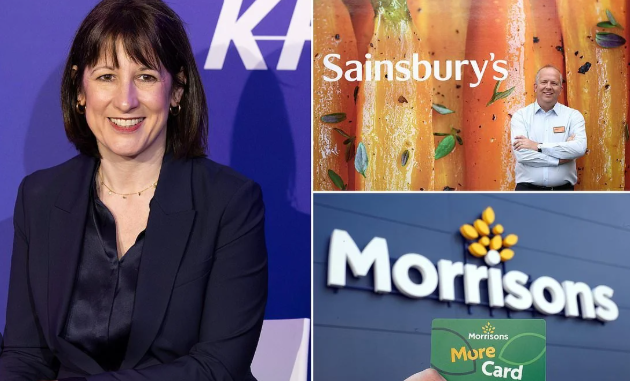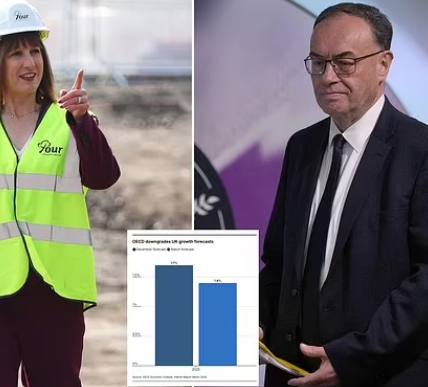Labour is blamed for huge supermarket jobs blow: Sainsbury’s and Morrisons to lay off thousands as costs soar after Rachel Reeves’ budget and consumer confidence slumps_nhy
Thousands of jobs are to be axed across two leading supermarket chains after Rachel Reeves‘ Budget hit businesses with a major costs rise.
Sainsbury’s is to lay off 3,000 staff due to what it said was a ‘particularly challenging cost environment’, despite the firm seeing bumper Christmas sales.
Last November the firm warned that changes in the Budget would mean an extra £140 million in costs, with chief executive Simon Roberts warning of potential ‘tough choices’ as a result.
Sainsbury’s was already pushing to save £1 billion over the coming years, but it is understood the cut in senior management roles is partly linked to increases in national insurance contributions (NICs) ordered by the Chancellor.
The increase is due to come into effect in April, alongside a rise in the national living wage to £12.21 per hour.
At the same time, ailing Morrisons is to cut 200 staff roles in a major company shake-up of customer service, employee engagement and payroll.
There was further woe today as new figures showed a record-breaking rise in the number of firms at serious risk of collapse.
Consumer-facing sectors such as hotels, leisure and retailers have particularly been under pressure, advisory firm Begbies Traynor said.

Sainsbury’s is to lay off 3,000 staff, after chief executive Simon Roberts (pictured) warned of potential ‘tough choices’ as a result of the Budget

Sainsbury’s was already pushing to save £1 billion over the coming years, but it is understood the cut in senior management roles is partly linked to increases in national insurance contributions (NICs) ordered by the Chancellor.

At the same time, ailing Morrisons is to cut 200 staff roles in a major company shake-up of customer service, employee engagement and payroll.
Its latest Red Flag Alert report showed that about 46,850 businesses were in ‘critical’ financial distress over the final three months of 2024.
This was a 50 per cent increase on the number of firms on the brink of collapse over the previous three-month period.
The data was released alongside a separate new survey from S&P Global, which showed business confidence worsened this month amid warnings of job cuts and rising inflation.
A Downing Street spokesman insisted ‘difficult decisions’ in the Budget would help pave the way for economic growth.
But shadow chancellor Mel Stride said consumer confidence was being ‘battered at the hands of the Chancellor’.
‘It is no surprise as overnight we saw even more big employers – who cannot afford Labour’s tax rises – cut jobs,’ he said.
‘A chancellor out of her depth means millions pay the price.’
With growth stagnant and inflation turning higher, the Chancellor jetted to the World Economic Forum in Davos to try to drum up investment from global bosses.
During the meetings she has repeatedly insisted on her commitment to growth and that she is taking on regulators getting in the way of business.
But critics say it is her own policies, in particular the £25billion raid on employer national insurance that stunned business, that are doing the biggest damage – and that there has so far been little sign of the promised drive to boost the economy.
Today, a closely-watched new survey by data firm GfK reveals that the gloom is now feeding through to ordinary households. It showed that consumer confidence has this month dropped to its lowest level since December 2023.
Sainsbury’s said the job losses, which affect about 2 per cent of its 148,000 staff, are part of plans to ‘simplify the business’ amid a ‘particularly challenging cost environment’.
As well as affecting shop-floor staff, the move will involve axing 20 per cent of senior management workers over the coming months as part of a shake-up of its head office.
The company announced its ‘biggest ever’ Christmas sales period, and said it would make about £1 billion in annual profit.
The retailer also said it had decided to close its remaining 61 Sainsbury’s Cafes, saying shoppers do not use them regularly.
It will also close its remaining patisserie, hot food and pizza counters in-store and make the most popular items available in the aisles instead.
Mr Roberts said Sainsbury’s is ‘facing into a particularly challenging cost environment which means we have had to make tough choices about where we can afford to invest’.
He added: ‘The decisions we are announcing today are essential to ensure we continue to drive forward our momentum but have also meant some difficult choices impacting our dedicated colleagues in a number of parts of our business.
‘We’ll be doing everything we can to support anyone impacted by today’s announcements.’
Sainsbury’s said earlier in January that it would give staff a 5 per cent pay increase in 2025 to help workers through a ‘particularly tough cost inflation environment’.
But the supermarket is also trying to reduce costs by £1 billion in the coming years, and in 2024 it cut about 1,500 roles.
The latest job cuts will see the company ‘explore redeployment opportunities where this is possible’ for people affected.
The Unite union, which represents more than 7,000 Sainsbury’s workers, said the cuts were a result of ‘corporate greed’, pointing to large profits at the retailer in recent years.
Bally Auluk, national officer of the shop workers union Usdaw, said it would be ‘working hard to ensure our members are supported throughout the process and as many people as possible remain in employment with the company’.
There are currently 497 Morrisons stores across the UK which see a total of over 11-million customers per week.
The supermarket giant said it would be scaling back operations at its Rathbones bakery in November, halting the production of specialist bakery products and making less produce.
A £2.5billion deal in January 2024 saw the company, which was overtaken by Aldi as the UK’s fourth-largest supermarket almost three years ago, sell off 337 off its petrol stations to help pay down debts.
A spokesperson for Morrisons said the company carried out a ‘review of its people structure’ to make sure it is ‘offering stores and sites and timely and consistent service’.
And Primark’s parent company Associated British Foods has revealed a sales setback caused by the darkening mood among consumers since the Budget.
Finance director Eoin Tonge said: ‘There’s no doubt we are suffering from a weak consumer, particularly elements of our consumer base who are clearly struggling.’



